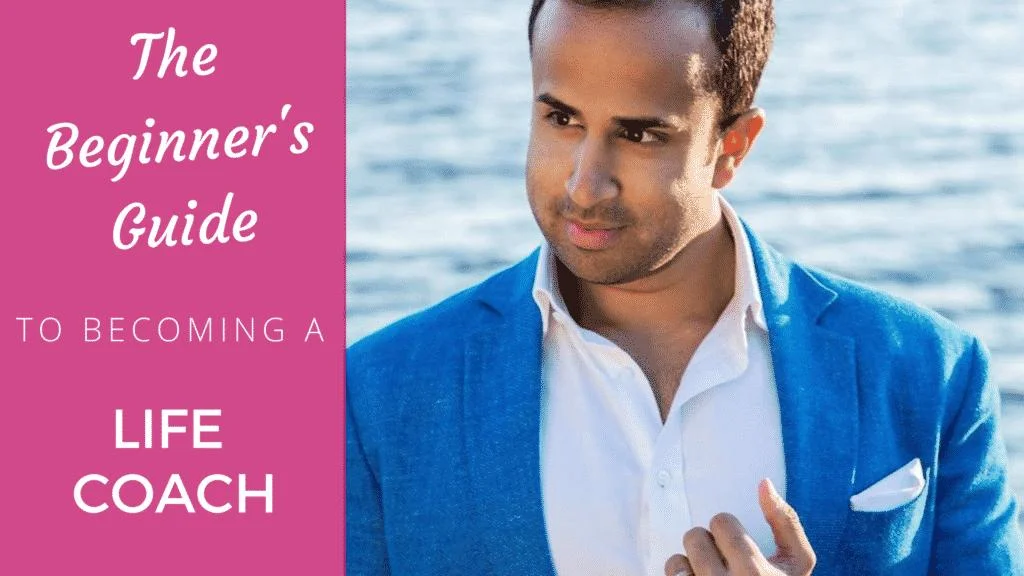Today people’s lives have become more hectic and complex. Maintaining an unwavering focus on what you want becomes harder and harder.
Thoughts of un-attained goals can fester until unhappiness permeates into everyday life.
That’s why, more and more people are becoming aware of the need for self-improvement for a fulfilling life. But making a positive change in oneself is easier said than done, right? Everyone who has tried to kick an old habit or develop a new one would definitely agree.
What if they had someone who would push them, keep them on the right track? What if they had someone like you – a Life Coach?
I can see the wheels in your head turning. “Can I make a living out of helping others make a positive change in their lives?” I hear you ask.
Yes, you definitely can. Up until the a few years ago, Life Coaching was something not a lot of people knew about. But now, this career path has grown significantly and has become a respected and established occupation.
According to a report by market research , the demand for Life Coaches is set to reach $1.34 Billion by 2022. And number is only getting higher. This gives you an incredible opportunity to make a difference in the lives of others while making a profitable career out of it.
But your success as a Life Coach depends a lot on how you set yourself apart from the hundreds and thousands of other coaches around. And that is exactly where I’m going to give you a helping hand.
So let’s talk business, shall we?
In Brief : The Beginner’s Guide To Becoming A Life Coach
How Can You Become A Life Coach?
- Find Your Speciality – Specialize in a niche like work, spirituality, health, relationships, confidence, or academics to stand out in life coaching.
- Get Certified – Get certified for trust and legitimacy, considering factors like completion time, cost, and accreditation.
- Get In The Right Frame Of Mind – Cultivate emotional availability, positive habits, and self-improvement to become a great coach.
- Network, Network, And Then Network Some More – Build a strong network through professional organizations, social media, and engaging conversations.
The Most Common Questions In Life Coaching
- What Happens During A Coaching Session? – In coaching sessions, set goals, explore all aspects related to the goal, and discover new options to help clients make meaningful changes in their lives.
- How Long Should I Keep My Coaching Sessions? – Optimal coaching sessions are 45 to 60 minutes long, conducted weekly, fortnightly, or monthly, depending on client needs.
- Do I Need An Office Or Centre To Coach? – Coaching can occur over the phone for convenience, with face-to-face sessions offered periodically for a deeper understanding of client progress.
- How Many Coaching Sessions Should I Offer To Each Client? – Tailor the number of coaching sessions to each client’s needs, considering the breakdown of smaller goals leading to their larger, life-changing objective.
The Truth About Life Coaching
- Life Coaching Is A Business – Life Coaching is a business that involves not only deep conversations with clients but also requires skills in marketing, accounting, sales, and finances.
- Getting Paid Is A Long Winding Process – The process of getting paid in life coaching involves offering initial services for free to build a brand, but it’s crucial to transition to charging for services once there is market demand.
- Only Good Coaches Can Build A Business – In the age of internet transparency, only good coaches can sustain a business as substandard services quickly lead to a loss of reputation.
- People Need Life Coaches Because They Have No One Else – People seek life coaches because they often lack a judgment-free space to discuss problems, emphasizing the coach’s role in creating an open and supportive environment for clients.
Who is a Life Coach?
According to the International Coaching Federation (ICF), Life Coaching is defined as “partnering with clients in a thought-provoking and creative process that inspires them to maximize their personal and professional potential.”
This means helping people become the best they can be, at home or at work, so they live a happy and successful life. While this may sound similar to what a therapist or a counsellor does, in reality it is quite different.
Unlike a therapist, you don’t deal with a person’s past. It is important, yes, but what is more important to you, and your client is their present and the future. After all, the singular reason they need you in their lives is so they can reach future goals.
So, as a Life Coach, your role is to be their guide and mentor and help your clients move in the right direction in their lives based on what they want to achieve. But because every person is different, their ideas of success also tend to be different.
That’s why you don’t define your client’s goals – you push them in the right direction so they can figure out what they want from life. And then you motivate them to reach their full potential to achieve those established goals.
How can you become a Life Coach?
Before you even get started, you need to ask yourself a few important questions. You need to determine whether you have it in you to make a difference in the lives of others.
Are you passionate about helping people become better versions of themselves? Are you good at understanding people and guiding them towards making a positive change in their lives? Do you enjoy spending time talking to, and learning about, people?
If your answer to even one of these questions is a “No”, then I’m sorry to say that Life Coaching isn’t the space for you. However, if you’ve answered in affirmative to all of these questions, then you have it in you to become a successful Life Coach.
And I’m here to tell you how you can get started on your way to becoming a Life Coach:
1. Find your Speciality
Life Coaching in itself is a very vast field. From marriage and relationships to time management or fitness, there a plethora of niches available to you. And if you refine your area of coaching, you will attract a very specific group of clients, allowing you to provide more value to your clients.
Additionally, as a “general” Life Coach, you will face a lot more competition out there. By working within a niche, you’ll be able to hone your expertise in a specific area that is relevant to your clients, allowing you to stand above the crowd.
Here are some of the areas you could specialize in as a Life Coach:
● Work
● Spirituality
● Health and Wellness
● Relationships
● Academic Issues
Your area of specialty has limitations only by your imagination. Dig deep into yourself and see where your strengths lie, because that is where you niche will come from.
2. Get certified
Trust lies at the crux of a relationship between a Life Coach and a client. If you have a certification, it is easier for a client to lose their inhibitions and allow themselves to trust you completely.
The right training will give you the credentials to build a successful coaching business, so make sure you choose one that fits all your criteria. Some things to keep in mind are when choosing the right coach training are:
● How long will it take to complete?
● How much does it cost?
● How is the course delivered?
● Is it accredited by an international coaching federation?
Training with a mentor is also very helpful. In my own experience a training other coaches I have seen how it helps them undergo their own process of self-improvement. This extra empowerment is very important as it also legitimizing your coaching credentials. After all, without having control over your own life, it is impossible to make a positive change in someone else’s. Learn more about my seminar here.
3. Get in the right frame of mind
The hallmark of a good coach is emotional availability. Think about it: your clients will need you at crucial junctures in their lives. If you are not emotionally ready to manage your client’s baggage, you will not be able to help them get over it and keep moving forward.
Great listening skills and a high emotional quotient are essential to becoming a great coach. Having positive habits that keep you motivated is very essential. Ask yourself questions, learn how to navigate through your own problems and become a role model for your clients.
The more you dig deep within yourself, the more you will be able to help your clients. And needless to say, the more you help your clients, the more successful your business will be.
4. Network, network, and then network some more
Connections are at the base of a successful coaching business. Developing your network and doing collaborations will help your business grow exponentially.
There are many professional organizations that not only give coaching certifications, but can also help you build this network. These include:
● International Coaching Federation
● International Association of Coaching
● International Association of Professional Life Coaches
● American Coaching Association
While you enroll in one of the above organizations, don’t forget the importance of social media. Today, social media gives you the best platform to target the exact market you hope to reach, while keeping your costs at the least.
Additionally, you can use your social media page to share your views and ideas, positioning yourself and your image the way you want. This will help you attract clients who already trust your judgement and want YOU as a Life Coach and no one else.
Last, but not the least, talk to people. Talk to other Life Coaches, talk to your family members and friends, even talk to people you treat only as acquaintances. The more you talk, the deeper your insight becomes into what drives and motivates different people.
This insight is what will help you understand your clients and tailor your offerings to their specific needs, adding more value to their lives.
What types of people hire a Life Coach?
Today, the world around is a stressful place. The stress to succeed, to form meaningful relationships, to live a well-rounded, fulfilling life can be overwhelming. Yet, the same stress is what pushes a person off-track, leaving them unable to move forward in life towards their life goals.
This means, all the people who hire a Life Coach have one thing in common – the desire to improve themselves. But also the awareness that they can’t do it alone.
They are willing to invest time and money in self-improvement and have someone to push them to achieve their potential.
How can you set yourself apart from other Life Coaches?
As i mentioned earlier, the first step to becoming a successful Life Coach is to find your niche. You may look at other what other coaches are doing for inspiration, spending a lot of time trying to figure out how you can be more like them.
But it is trying to be like other coaches that will hold you back. Because to be a successful Life Coach, the most important thing is to be aware of what makes you different, and embrace the challenges you’ve experienced through your life.
You are your niche. You need to believe that the world needs what you, and only you can offer. And once you make a list of what makes you different, your niche will slowly start becoming clearer, helping you realize what you can offer to your clients to set yourself apart.
To help you along, I will ask you three questions that will allow you to figure out your niche. If you use these as a guide, I can assure you that you will be able to add more value to your client offering.
a. What makes you unique?
You are the sum of your experiences, and it is those experiences that define you and your personality. But, when I talk about personality, it is much more than whether you’re funny or nice. It encompasses how you see the world, and how the world sees you.
Can your clients relate to you? Do you know how to put your clients at ease? Are you likeable? By putting your own unique personality out there, you will be able to connect with potential clients on a much deeper basis, attracting them to your Life Coaching business.
b. What is the quality of your offering?
A person who offers a substandard product or program might attract a few clients, but their business is never going succeed in the long run. At the same time, you could offer the world’s best coaching program, but if the clients don’t perceive its quality, your business will not grow.
It might sound complicated, but there are some quick and easy ways to build your credibility and make a great first impression. Get professional head-shots, focus on designing your cards to stand out, and of course, make sure you website is attractive and leaves an impression.
You are a brand, and you should look at all aspects of your branding to create a quality, cohesive offering. That’s why I suggest that you invest as much time and money as you can to ensure that every touch point your client is exposed to reflects the quality of the programs you offer.
c. What can your clients expect from you?
No matter what your niche, you will soon realize that there are hundreds of other coaches that offer programs that are similar. What will set you apart is what your client can expect when they engage with you. This is your brand promise.
Similar to a mission statement, figuring out your brand promise will help you position yourself effectively in the market, setting you apart from your competitors. Many coaches make the mistake of trying to offer the world so they can attract the world, but that will only muddle your target market.
By establishing a brand promise and ensuring that everything you offer falls within that, you will be able to stand out in your niche and transform yourself into a strong brand. This will further your credibility and help you grow your business.
By answering these three questions, you’re not only positioning your coaching business as unique. It also sets the stage to attract clients who will connect with you at a deeper level. This ensures that they, and their extended circle, come back to you over and over again.
The most common questions in Life Coaching
1. What happens during a coaching session?
At the beginning of every session, the idea is to set a goal for the session and explore every aspect of the client’s life which interacts with that goal. As you and your client dig deeper, you will discover options to achieve these goals that neither you, nor your client, had previously thought about.
Utilizing these options, you set a list of actions for your client that will help them make the changes needed to move forward and get closer to their goals.
2. How long should I keep my coaching sessions?
While the length of coaching sessions may vary from coach to coach, as well as client to client, the optimal length of a session can approximately be between 45 to 60 minutes. You can choose to do these sessions weekly, fortnightly or monthly, depending upon the requirements of your clients.
3. Do I need an office or centre to coach?
Most of the times you coach your clients, it is going to happen over the phone. This makes it convenient for a client to get in touch with their coach whenever the need arises, while also giving you the flexibility to fit a number of clients into what will become a busy schedule.
You can offer face to face coaching a specific number of times a month to get a much deeper understanding of your client’s progress that will help you mold your offering accordingly.
4. How many coaching sessions should I offer to each client?
Most of your clients will come to you with a goal in mind that is life changing. But to achieve this goal, it is important to break it down into smaller goals which, as they are achieved, will help your client move towards the bigger goal.
The number of sessions needed can vary from client to client, and it is important to stay stock of their needs before deciding upon the number of sessions that will be required.
The truth about Life Coaching
While you research Life Coaching as a career, you will find a lot of information that gives you an overall idea of what you need to do and what you can expect once you become a Life Coach. But there are certain aspects that you will most probably not be prepared for.
That’s why I’d like to list down a few points that most people won’t tell you about Life Coaching so you can make up your mind whether this career path is for you or not, before you make a hefty investment in terms of time and money.
1. Life coaching is a business
Life Coaching isn’t just about having deep conversations with your clients and basking in the glow as you see them flourish in their lives. Life Coaching, like any other business, requires you to handle marketing, accounting, sales and finances.
This means, to ensure that your business is a success, you need to take time out to learn how to run a business properly before you even begin any actual coaching sessions.
2. Getting paid is a long winding process
When you start coaching, to make a name for yourself you will need to offer your services for free to friends, family and acquaintances. However, many coaches never take that next step to becoming a Life Coach that actually makes money.
While it is important to gain experience and create a brand in the initial stages, it is important to stop offering free services when you realize your name, and your offerings, have a demand in the market. Once there is a demand, it means people are willing to pay for your services, and you should ensure you charge what you believe your offerings are worth.
3. Only good coaches can build a business
Today, the internet has created a whole new world of transparency. The minute a coach offers service that is substandard, you can guarantee that their business is not going to last long. People will always talk, so it is your responsibility that they only say good things about you and your business.
4. People need life coaches because they have no one else
Most people are afraid of bringing up problems for the fear of being judged. And sometimes, a Life Coach is the only person they feel that supports their personal interest, the only person they can speak to openly.
This means, it is your responsibility to help people open up, asking them questions that will lead to insights about their lives. Because it is these insights that will help you understand your client like no one else has been able to, so you can make the difference in their lives they need.
Reading about these truths may make you feel like Life Coaching is challenging career. And it is. But if you are up for the challenge, becoming one can be a highly rewarding experience and great way to grow as person yourself.
Frequently Asked Questions (FAQs)
What are life coaching skills?
Life coaching is a process that helps you to get clear about what you want out of life and how to get it. A life coach will help you to explore your thoughts and feelings on all the most important areas of your life such as health, career, relationships, money, family, values and goals. Asking the right questions and thinking through your answers is an important part of the coaching process. You will learn that you have more control over your own destiny than you may have thought. A life coach will help you use the strengths and resources you already have to achieve the life you desire.
What does a life coach do?
A life coach helps people improve their lives. Life coaches are usually paid by the hour and work with clients to help them reach their goals by providing them with valuable life coaching skills and techniques that they can apply to their lives immediately. These coaches help people deal with different issues so they can move on and improve what they want in life. Others help people with self-esteem, confidence, career, and relationships.
What does a life coach do for you?
A good coach will help you define your goals and set a deadline to achieve it. A good coach will keep on motivating you in achieving your goals. A good coach will also make sure that you are not just achieving your goals, but also keep you grounded and make sure that you are following the right path to accomplish your goals. A coach will also teach you how to balance your life.
Who needs a life coach?
The benefits of having a life coach are limitless. Whether you’re looking to get out of debt, improve your health, manage your work and life balance, or you’re looking to make more money and live the life of your dreams, a professional coach can help you reach your goals faster and easier than you ever thought possible. A good coach listens to you, understands your needs, and helps you achieve more in less time. After all, time is money!
Why would a person need a life coach?
Life coaches can be hired to coach someone to succeed in their professional and personal lives. The life coach will help him/she to define his/her goals. The life coach will then hold the individual accountable for spending time working towards those goals, as well as helping that individual to overcome any obstacles which might stand in his/her way of reaching those goals. The life coach will also provide encouragement and motivation to keep going when the going gets tough.
How to become a life coach?
One of the most popular, fastest-growing industries in the world is coaching. In fact, the industry is projected to reach $11.8 billion by 2020, a 19% average annual growth rate. Starting your own coaching business can be a rewarding and profitable venture. As a life coach, you’ll help others to achieve their goals and overcome their challenges.










I read your content. Very nice. Your content is very informative. The content you are writing about is very important.
Your posts are always well-supported by facts and figures.